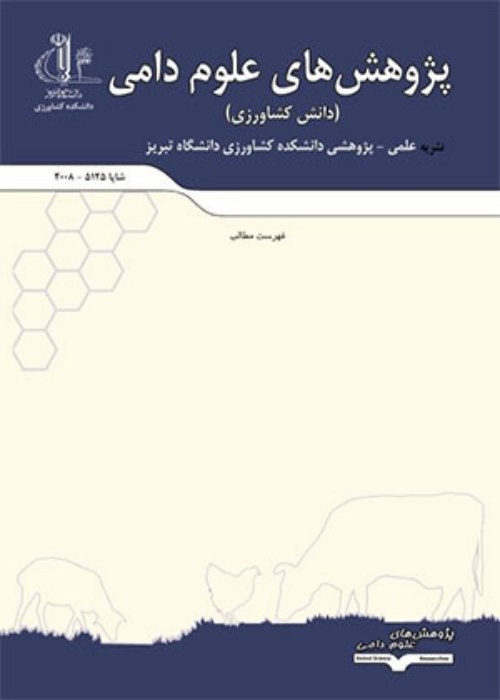Effect of different levels of dietary metabolizable energy and protein on growth performance, carcass traits and energy and protein efficiency of Japanese quails in the starter period
Author(s):
Article Type:
Research/Original Article (دارای رتبه معتبر)
Abstract:
Introduction
Determination of optimum level of energy and protein requirements for Japanese quail in different periods (starter, grower and finisher) improves the growth performance and economic efficiency. This study was conducted to investigate the effect of different levels of dietary energy and protein on energy and protein efficiency, carcass characteristics and performance of Japanese quail during starter period.Materials And Method
Experiment was performed by 450 one-day-old quail chicks based on a completely randomized design in a 3 × 3 factorial arrangement with 5 replicates and 10 chicks per replicate. Experimental diets containing 3 levels of energy (2700, 2800 and 2900 kcal/kg) and 3 levels of protein (24, 25 and 26 %). Before the formulation of diets, the chemical composition of feed ingredients were determined by Near Infrared Spectroscopy (NIR). Experimental diets were formulate based on corn-soybean meal using the WUFFDA software for the starter period (1 to 10 days). At the end of experiment (10 d), a bird was randomly selected and slaughtered to evaluate carcass characteristics.Results And Discussion
Feed intake was not affected by dietary energy or protein levels (P>0.05), although energy levels of 2800 and 2900 kcal/kg reduced the feed intake numerically (P = 0.098). In addition, there was no interaction between dietary energy and protein levels for feed intake (P>0.05). Increasing the dietary protein level had no effect on weight gain and feed conversion ratio (P>0.05), but the dietary energy level affected the both weight gain and feed conversion ratio (P0.05). The energy level had a significant effect on weight gain and feed conversion ratio (P0.05), although the energy level of 2700 kcal/kg increased the breast weight (P= 0.056). The dietary protein level had a significant effect on carcass and thigh weights (P0.05), but the energy level of 2700 kcal/kg and protein level of 24% increased the breast weight numerically (P=0.056). The dietary protein level had a significant effect on protein consumption (P0.05), but at the lowest energy level (2700 kcal/kg), reduction of protein level to 24% resulted in an increase of energy efficiency ratio numerically (P=0.0680). Moreover, at the highest energy level (2900 kcal/kg) reduction of protein level to 24% resulted in an increase of protein efficiency ratio numerically (P=0.073). The carcass fat content was not affected by dietary energy or protein level (P>0.05). The dietary energy level had a significant effect on carcass protein content (P0.05). Conclusion
The results of current study showed that the energy level of 2700 kcal/kg along with 24% crude protein in starter diets, can improve the growth performance of Japanese quail. Keywords:
Language:
Persian
Published:
Journal of Animal Science Research, Volume:27 Issue: 4, 2018
Pages:
165 to 181
magiran.com/p1814890
دانلود و مطالعه متن این مقاله با یکی از روشهای زیر امکان پذیر است:
اشتراک شخصی
با عضویت و پرداخت آنلاین حق اشتراک یکساله به مبلغ 1,390,000ريال میتوانید 70 عنوان مطلب دانلود کنید!
اشتراک سازمانی
به کتابخانه دانشگاه یا محل کار خود پیشنهاد کنید تا اشتراک سازمانی این پایگاه را برای دسترسی نامحدود همه کاربران به متن مطالب تهیه نمایند!
توجه!
- حق عضویت دریافتی صرف حمایت از نشریات عضو و نگهداری، تکمیل و توسعه مگیران میشود.
- پرداخت حق اشتراک و دانلود مقالات اجازه بازنشر آن در سایر رسانههای چاپی و دیجیتال را به کاربر نمیدهد.
In order to view content subscription is required
Personal subscription
Subscribe magiran.com for 70 € euros via PayPal and download 70 articles during a year.
Organization subscription
Please contact us to subscribe your university or library for unlimited access!


